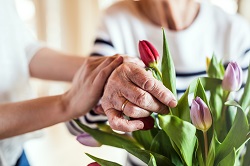Importance of friendship as we age
By Laura Roias, LICSW

When you’re a caregiver, you know how helpful it is to have the support of your friends and how difficult it is if you don’t. The person you’re providing care for may feel the same way.
In addition to maintaining your own friendships, you have an important role to play in supporting the friendships your loved one may have. Friends provide camaraderie, comfort and fulfilling experiences. Friendships can also be good for health because they can:
- Speed recovery time after illness
- Lower blood pressure
- Strengthen the immune system
- Lower the risk of heart disease
- Sharpen memory
- Improve sleep quality
People who are engaged socially tend to be healthier, even if they have complex medical conditions. By adhering to healthy habits, they may feel better and continue to be able to socialize. Friendships can actually help them live longer.
The evolution of friendship
Friendships evolve as people get older. People tend to shed superficial relationships and cultivate deeper, more meaningful ones. Older people are more tolerant of their friends’ imperfections. They bring a lot of experience to relationships, and they know what is important over the long term.
As people age, they may also have more time available to dedicate to friends. Friends can provide mutual understanding, empathy and companionship.
Impact of strained friendships and loneliness
The negative impacts of strained friendships are serious. A 2017 study sponsored by the National Institute on Aging showed that people with strained friendships were more likely to suffer from chronic illnesses like diabetes, heart disease and psychiatric problems as they got older. By contrast, strained family relationships have not been linked to increased illness.
Loneliness in general is a problem for older adults. It has been linked to high blood pressure, heart disease, stroke and even death. A study published in Perspectives on Psychological Science in 2015 concluded that a lack of social connections is as damaging to a person’s health as smoking 15 cigarettes a day.
Loneliness has also been linked to a higher risk of dementia and depression. Depression can then trigger loss of appetite, disruptions in sleep and an overall decline in health.
How to meet new people
It can be difficult, as your loved one ages, to sustain friendships, because people move away, become ill or pass away. Your loved one needs to grieve those lost friends. But there are ways they can make new friends, too. The ideas below may work for your loved one as they are, or you can adapt them to his or her interests and abilities:
- Volunteer: It’s a great way to meet people and contribute to a need in the community.
- Join a senior center: Your loved one, if able, can participate in activities and classes, and meet people their age who may be having similar experiences. Massachusetts Councils on Aging maintains a listing of senior centers and councils on aging throughout the commonwealth.
- Attend church or synagogue: Many offer activities just for seniors.
- Join a book club: It’s a great way to see people on a regular basis and get some intellectual stimulation. If it’s hard for your loved one to get out, perhaps he or she could set up a book club with friends online. Audiobooks can be a good alternative if vision is an issue.
- Use social media: These websites could help people reconnect with old friends and learn about activities they can participate in.
- Visit a Memory Café: These informal gatherings offer a place for you and your loved one to socialize, listen to music, play games and enjoy other activities.
How to nurture friendships
Here are some tips for nurturing and maintaining friendships. If your loved one can’t do them independently, you can try doing them together.
- Meet on a regular basis. It could be for breakfast, a movie, a walk or another activity.
- Communicate. Calling, emailing or texting are great ways to keep in touch. It’s important for friends to know what’s going on in each other’s lives.
- Help out in difficult times. Make a meal for a sick friend, call or send a card to someone going through a tough time.
- Make a connection. It’s important to share feelings and connect on an emotional level.
Keep in mind that these suggestions may be helpful for you as a caregiver as well.
You may meet some resistance
Be prepared if your loved one makes excuses for not going to planned outings. He or she may feel tired, shy or a little nervous. These are normal reactions. Do your best to encourage your loved one to attend these outings. Start small. Perhaps one event a month, then work up to more. The results of going out, being active, meeting new people and cultivating new friendships will far outweigh any feelings of reluctance.
Another kind of resistance you may run into is from your loved one’s friends, especially if your loved one has a serious diagnosis. Friends may feel uncomfortable visiting for a variety of reasons. Your loved one’s diagnosis could remind them of their own mortality, or they simply may not know what to say.
If friends’ visits are becoming rare, encourage your loved one to keep in touch in other ways. Social media, email, calling on the phone and sending cards are some examples.
Encouraging and supporting friendships will go a long way toward helping your loved one’s emotional and physical health.
Laura Roias, LICSW, is Manager of Behavioral Health for Fallon Health’s NaviCare program.
More...
Activities
Self care
Wellness
Get more tips
Subscribe to the Caregiver Connection, and we will send you an email when a new article has been posted.
SUBSCRIBE
Take the next step
Our customized care programs focus on keeping older adults at home while also supporting you, the caregiver.
LEARN MORE